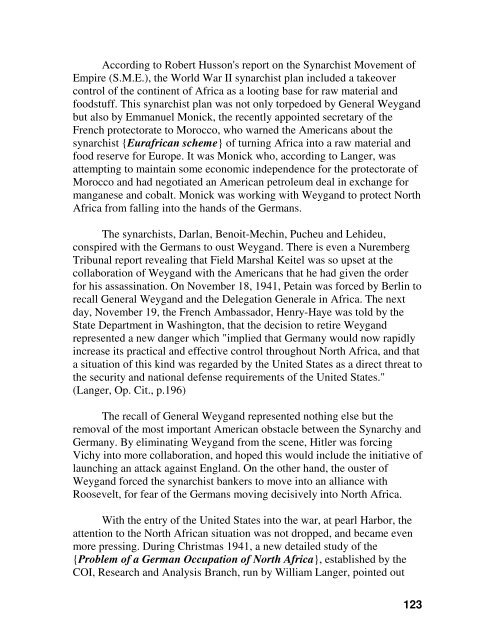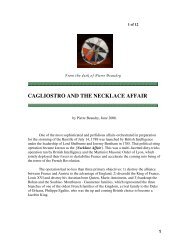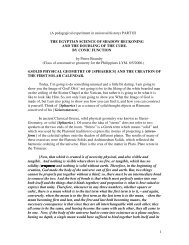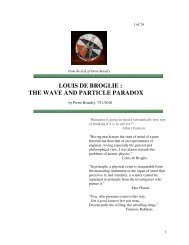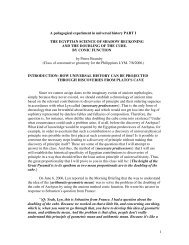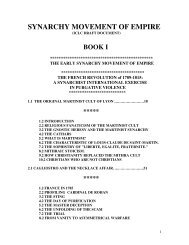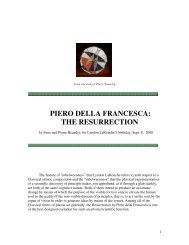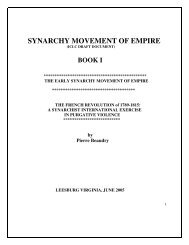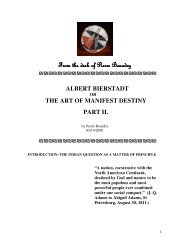synarchy movement of empire book ii - Pierre Beaudry's Galactic ...
synarchy movement of empire book ii - Pierre Beaudry's Galactic ...
synarchy movement of empire book ii - Pierre Beaudry's Galactic ...
Create successful ePaper yourself
Turn your PDF publications into a flip-book with our unique Google optimized e-Paper software.
According to Robert Husson's report on the Synarchist Movement <strong>of</strong><br />
Empire (S.M.E.), the World War II synarchist plan included a takeover<br />
control <strong>of</strong> the continent <strong>of</strong> Africa as a looting base for raw material and<br />
foodstuff. This synarchist plan was not only torpedoed by General Weygand<br />
but also by Emmanuel Monick, the recently appointed secretary <strong>of</strong> the<br />
French protectorate to Morocco, who warned the Americans about the<br />
synarchist {Eurafrican scheme} <strong>of</strong> turning Africa into a raw material and<br />
food reserve for Europe. It was Monick who, according to Langer, was<br />
attempting to maintain some economic independence for the protectorate <strong>of</strong><br />
Morocco and had negotiated an American petroleum deal in exchange for<br />
manganese and cobalt. Monick was working with Weygand to protect North<br />
Africa from falling into the hands <strong>of</strong> the Germans.<br />
The synarchists, Darlan, Benoit-Mechin, Pucheu and Lehideu,<br />
conspired with the Germans to oust Weygand. There is even a Nuremberg<br />
Tribunal report revealing that Field Marshal Keitel was so upset at the<br />
collaboration <strong>of</strong> Weygand with the Americans that he had given the order<br />
for his assassination. On November 18, 1941, Petain was forced by Berlin to<br />
recall General Weygand and the Delegation Generale in Africa. The next<br />
day, November 19, the French Ambassador, Henry-Haye was told by the<br />
State Department in Washington, that the decision to retire Weygand<br />
represented a new danger which "implied that Germany would now rapidly<br />
increase its practical and effective control throughout North Africa, and that<br />
a situation <strong>of</strong> this kind was regarded by the United States as a direct threat to<br />
the security and national defense requirements <strong>of</strong> the United States."<br />
(Langer, Op. Cit., p.196)<br />
The recall <strong>of</strong> General Weygand represented nothing else but the<br />
removal <strong>of</strong> the most important American obstacle between the Synarchy and<br />
Germany. By eliminating Weygand from the scene, Hitler was forcing<br />
Vichy into more collaboration, and hoped this would include the initiative <strong>of</strong><br />
launching an attack against England. On the other hand, the ouster <strong>of</strong><br />
Weygand forced the synarchist bankers to move into an alliance with<br />
Roosevelt, for fear <strong>of</strong> the Germans moving decisively into North Africa.<br />
With the entry <strong>of</strong> the United States into the war, at pearl Harbor, the<br />
attention to the North African situation was not dropped, and became even<br />
more pressing. During Christmas 1941, a new detailed study <strong>of</strong> the<br />
{Problem <strong>of</strong> a German Occupation <strong>of</strong> North Africa}, established by the<br />
COI, Research and Analysis Branch, run by William Langer, pointed out<br />
123


